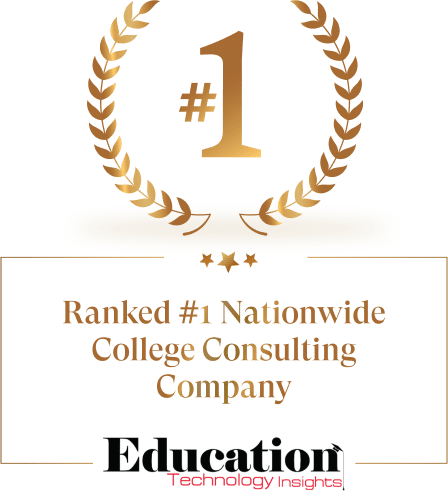For more than 17 years, Zenith Prep Academy has answered hundreds of frequently asked questions about college prep. Learn more about how you can get ready for the next stage of your life below or enroll in our data-proven program today for answers to all the questions you want to ask your college counselor.
What Should I Do to Prepare for College?
Good college prep consists of two pieces that, at Zenith, we call “Offense” and “Defense”. The foundation to any good college application is Defense: strong grades in challenging academic classes as well as a good standardized test score.
But good Defense alone does not get you the win: a strong academic profile will keep you from getting filtered out in the first round of admissions reviews, but it isn’t enough to get you admitted to a top college.
You also need good “Offense”. A good offense consists of deep extracurricular involvement that sets you apart from your peers. For a student interested in business, that might mean taking part in stock pitch and entrepreneurship competitions outside of school and starting your own venture. For a student interested in biology that might mean doing original research, getting it published, and then using that publication to get an internship in a lab.
Good offense looks different for every student, and Zenith counselors help students and families find the right mix of offensive and defensive strategies for each student.
When Should I Start Preparing for College?
How about right now? You can start planning for college anytime, but the sooner you start the more time you have to build a strong profile. At Zenith Prep Academy, we work with students in grades 6-12 to ensure they have a powerful college application.
What Factors Should I Consider When Choosing a College?
Everyone has different priorities when choosing their ideal college, but some of the most common ones are:
- Academic programs: do they have majors or minors that interest you? Are there academic programs outside of the traditional major that might help you meet your goals?
- Financial aid and scholarship opportunities: while some parts of the financial aid process are managed by the federal government, individual colleges often have their own scholarships and merit aid procedures.
- Location: Are you trying to break into a particular industry? Going to college in a geographic region that has internships in that field can be really helpful.
- Campus size: Some students want a large, boisterous, and lively student body, others might favor a smaller college where professors might be able to give students more individualized attention.
- Campus life and extracurriculars: College is more than just a set of classes: the extracurricular opportunities, summer research programs, and opportunities to connect with faculty, students, and business professionals are all part of what makes college a powerful experience.
How Can I Improve My Chances of Getting Into the College of My Choice?
There are many, many different things that a student can do: maximize grades, pour time into standardized test prep, double down on investing time in an existing extracurricular activity, starting a new research project or club. All of these things can be useful, but the fundamental challenge facing any student looking to build a profile is knowing where they might best invest their limited time given the number of different things that must be done. That is where Zenith counselors come in: we can help you figure out what is the most strategic path to take given your individual circumstances and goals.

What Standardized Tests Are Required for College Admissions?
While many colleges remain “Test Optional”—meaning that you don’t need to submit an SAT or ACT to be considered for college admissions—it is still a great idea to take these tests for several reasons.
- Some colleges, like MIT and Georgetown, have gone back to requiring the SAT or ACT for admissions. It is likely that other highly competitive schools will follow suite in the years to come.
- Even if SAT or ACT scores are not required for admissions, a strong score can help with admissions and potentially even make you eligible for additional scholarship money at some colleges.
- A score that is not-so-great for one school might be an excellent score for another school. You can choose which schools you submit your SAT or ACT scores to.
What Extracurricular Activities Should I Participate in to Strengthen My College Application?
That question depends entirely on YOU. Just because one student plays and instrument or another student has done a science research project, that does not mean you do. What colleges look for in extracurricular involvement is not whether you do one kind of activity or another but rather, when you are involved in any activity how do you do the following:
- Collaborate effectively with others.
- Show creativity in what you create or discover.
- Advance from joining an activity at the ground level to taking on more organizational responsibility.
- Move from learning new skills for yourself to sharing those skills and talents with others.
- Get increasing levels of validation for your work in those activities by winning awards and competitions (if those kinds of things are available).
- Stay committed to an idea or project over the long term.
- Plan effectively to help the organizations you are part of continue after you leave for college.
At Zenith, we find that students are best able to demonstrate these points in those activities that most excite them. Without some underlying drive or motivation, students won’t be able to grow in their activities over time. That we why, in our work with students, we start by exploring the interests that a student might want to dive into over the long term. Students can, of course, have multiple interests—for example, mathematics and knitting sweaters—and finding ways to combine those interests creatively is what often makes for the best college profiles (in the math and knitting example, a student might eventually do math research into the knot theory that makes knitting possible).
How Important Are Grades and GPA for College Admissions?
At any competitive school in the top 50 (including the Ivy League), academic achievement is the first thing that a college looks at. However, they do not just look at raw GPA. They consider if the student took challenging classes, if the trajectory of their grades is going up or going down, and if the student is taking classes that are related to their area of interest. Of course, grades are just part of what colleges look at. They will also look at standardized tests scores, extra curricular involvement, and consider your application holistically.
How Do I Request Letters of Recommendation?
The most important letters of recommendation are from your teachers. All colleges will require, at most, two letters of recommendation. One will ideally come from an 11th grade STEM teacher and the other will ideally come from an 11th grade humanities teacher (English, Social Studies, or World Language). A few pointers:
- Request this letter before you leave for summer break between 11th and 12th grade.
- Make sure to write a nice note that reminds the teacher about the specific things you did in the course and why you found those things valuable and interesting.
- Check in with your recommenders in the fall of 12th grade.
- You can also ask internship supervisors, a boss at work, or a coach to write a letter, but that letter should be one of the “optional” additional letters that some colleges let you submit.
- After a teacher submits your letter, make sure to write them a really nice thank you note!
What Resources Are Available for College Preparation and Planning?
Zenith Prep Academy offers a nationally recognized college counseling program for Ivy League and Top 25 universities. Our mentorship and strategies have assisted thousands of students, and we can help you, too.
Have more college prep questions? Contact Zenith Prep Academy and sign up for enrollment today. We’ll be your college prep guide from the moment you join until we hit “Submit” on your last application.






